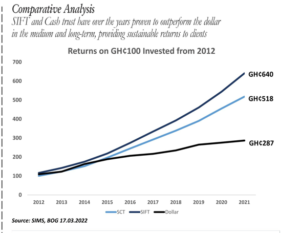Stanbic Investment Management Services
The recent strife between Russia and Ukraine has unnerved investors, sparking significant selloffs across asset classes in favour of safe-haven assets. The ongoing geopolitical conflict, poses a risk to an already dimmed global growth forecast, casting a spillover effect on the financial markets.
This, coupled with interest rate hike expectations in developed markets, has seen capital outflow from frontier and emerging markets, exerting pressure on their respective currencies and yields.
In Ghana, the cedi has experienced a dramatic decline (-14.63% YTD), undermined by negative investor sentiment and increased speculative activity. Demand for the dollar by corporate and offshore investors has surged amid Bank of Ghana intervention on both the spot and forward markets. Market data for 8th March depicted sustained FX demand with the central bank auctioning US$75million on the FX forward market against total bids of US$296.75 from offshore and corporate clients.
In prior years, Eurobond inflows during the first quarter cushioned the currency from such steep declines. However, the current global interest rate trends and Ghana’s deteriorating fiscal position have made the Eurobond option unfavourable. The key concern for investors is the impact of a weak cedi on their portfolios and possible hedging opportunities available on the market.
Outlook
Notwithstanding the inherent global risk and Ghana’s fiscal position, we view the recent plunge in the cedi as short-lived. We expect the cedi to stabilise once global certainty is restored, as Ghana’s short-term liquidity risks are sufficiently contained by the strong forex reserve buffer of US$9.7billion (4 months of import cover). Additionally, expected forex inflows from the IMF Special Drawing Rights (SDR) receipts and various loan syndications during the year will potentially curb the recent currency depreciation.


We perceive recent uncertainties in the market as transitory and encourage investors to focus on the medium-term outlook. We urge domestic investors seeking long-term sustainable returns to remain invested in their current holdings, as market stabilisation is imminent on the back of both fiscal and monetary interventions being rolled out. Comparatively, Stanbic collective investment schemes have delivered attractive returns despite market volatilities. Historical data show Stanbic Income Fund Trust has delivered an average return of 18.4% above the 1-year GoG bond return of 16.7% over the last 5-years.
The geopolitical tension is however very fluid, hence concerned investors may consider adding risk-hedging assets such as the New Gold Exchange Traded Fund (ETF) to their portfolios. Traditionally, gold has been a safe haven in volatile markets given its inverse correlation to traditional asset classes. Investors with near-term forex liability may hold hard currency to mitigate further potential currency losses. We believe cedi assets such as the Stanbic Income Fund Trust and Stanbic Cash Trust Fund will continue to provide sustainable returns to clients over a 1-year period and beyond.
Comparative Analysis
SIFT and Cash trust have over the years proven to outperform the dollar in the medium and long-term, providing sustainable returns to clients.










